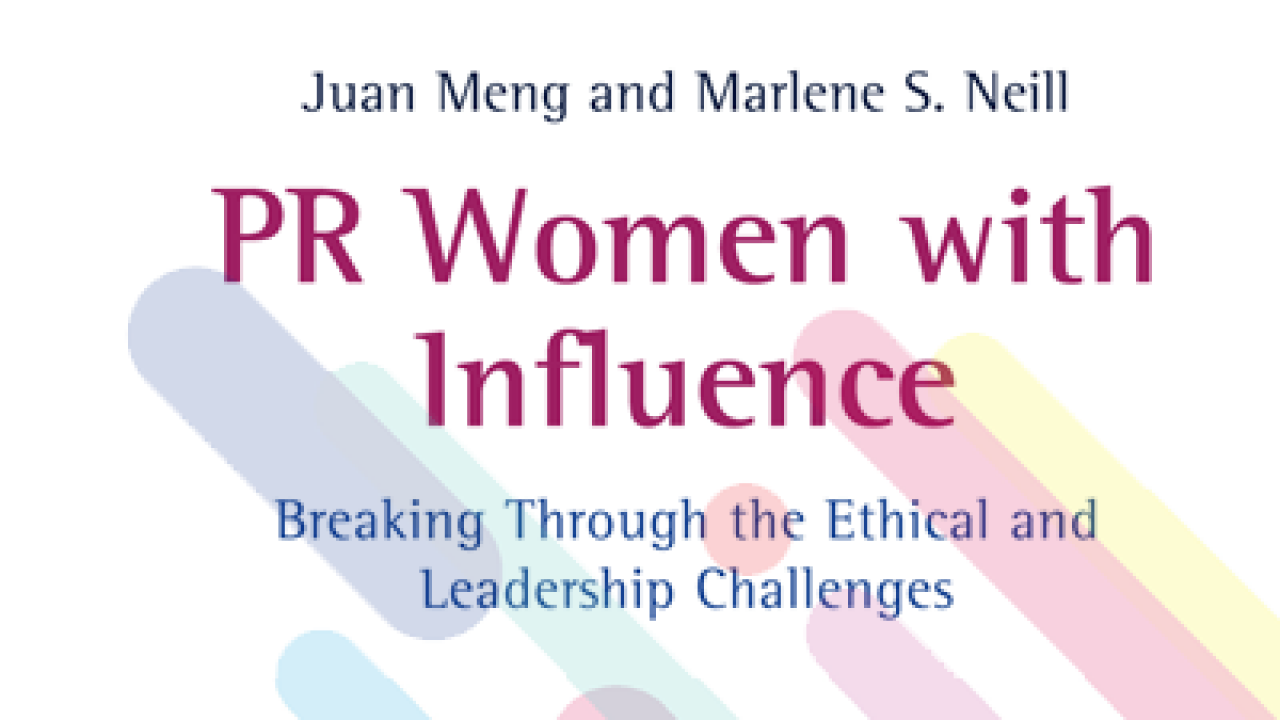January 27, 2021
Page Center and Plank Center study examines ethical leadership from the perspective of women in PR

By Marlene S. Neill, Baylor University & Juan Meng, University of Georgia
Being an ethical person is not synonymous with being an ethical leader. In fact, we found significant reasons for concern when we asked more than 500 female public relations and communication professionals to evaluate the highest ranked communication leader in their organization based on several key outcomes.
Our findings are published in the newly released book “PR With Influence: Breaking through the Ethical and Leadership Challenges.” The study was jointly sponsored by the Page Center and the Plank Center for Leadership in Public Relations. The mixed method study involved an online survey with 512 women working in public relations and communication and in-depth interviews with 51 women working in mid-management and senior-level positions.
Ethical leadership has been defined as “the demonstration of normatively appropriate conduct through personal actions and interpersonal relationships, and the promotion of such conduct to followers through two-way communication, reinforcement, and decision-making” (Brown, Trevino, & Harrison, 2005, p. 120). Consistent with this definition, a director of media and public relations who we interviewed said:
When it comes to ethical leadership, that you’re willing to set that standard and you’re willing to hold yourself to it and others to it. And you speak about it, you make it a priority, you call it out when you see it, when people are maybe doing things that technically are legal, but really are not ethical.
To better understand women’s perceptions of ethical leadership, we asked them to assess the top communication leader. On a positive note, top communication leaders received relatively favorable rankings on two behaviors associated with ethical leadership, which are:
- Conduct his/her personal life in an ethical manner, and
- Sets an example of how to do things the right way in terms of ethics.
However, women rated their communication leaders the lowest for the following actions:
- 1. Discusses business ethics or values with employees
- 2. Asks “what is the right thing to do?” when making decisions
- 3. Disciplines employees who violate ethical standards
When examining these same ethical behaviors by rank, we found that leaders serving in the top communication role rated themselves high on measures associated with ethical leadership.
However, employees in the lowest levels of an organization rated communication leaders significantly lower on the same behaviors. For example, employees two or more levels removed from the top communication leader ranked the following leader behaviors the lowest:
- Makes fair and balanced decisions
- Asks “what is the right thing to do?” when making decisions
- Disciplines employees who violate ethical standards
While it is not surprising to see lower-level employees may be inclined to rate senior executives or leaders with whom they have little contact or limited knowledge less favorably in terms of ethical leadership performance, it does present reason for concern and merits more attention.
The reason why this issue is of concern is from the perspective of role modeling. Moral or ethical managers need to set the tone for ethical behavior by both talking about the importance of ethics and core values and living it out to foster an ethical culture. As a president of a consulting firm explained:
From a cultural standpoint, are we as a corporation or as a company living the values of our company? Are we walking the talk in terms of the culture and the values of our company? Are we shining a light on not only where that’s happening in a way that is consistent with culture, but also shining a light on where we may see things that are happening inconsistently?

Based on our findings, it appears there are some communication issues as those closest to these executives rate them higher on ethical leadership implying that distance from the top is likely the issue rather than actual behaviors. Communication leaders need to be more deliberate about discussing the organization’s core values and fostering an ethical culture. They need to make a more concerted efforts to communicate with employees in lower levels of the organization.
Some of the actions they can take include the following:
- Employers should communicate ethics in a culturally relevant way through employeetestimonials and historical anecdotes.
- Employers should review their core values to identify any inconsistencies with their policies and reward systems and then make necessary revisions.
- Employers should conduct routine surveys to determine how employees rate the company/organization’s performance in regards to their core values.
- Employers should evaluate and reward employees who model ethical behavior through annual performance reviews and awards programs (Neill, 2016)
Neill has been a research fellow with the Page Center since 2018 and a Center scholar since 2015. She is an associate professor in the Journalism, Public Relations and New Media Department at Baylor University.
Meng is an associate professor at the University of Georgia and serves on the national board of advisors of the Plank Center for Leadership in Public Relations and is a member of the Arthur W. Page Society.
